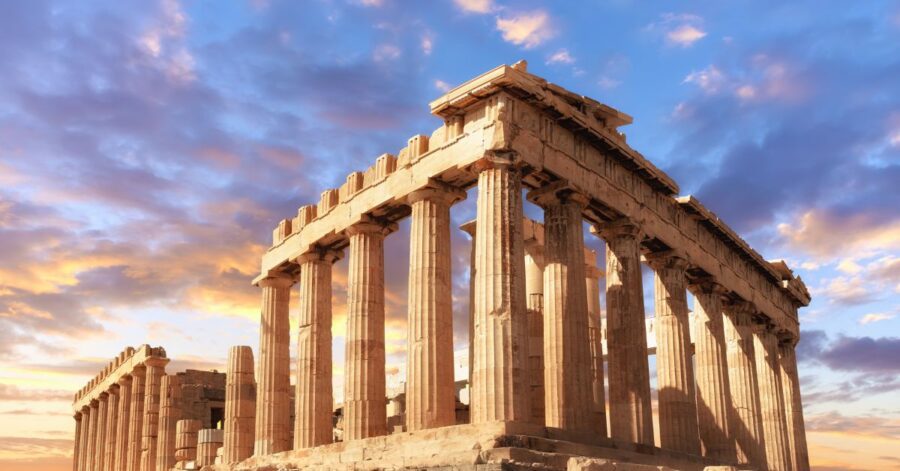Throughout human history, mythology has played a significant role in shaping cultures, beliefs, and worldviews. Pagan gods, with their diverse stories and attributes, have been central to many ancient civilizations. As Christians, we often find ourselves confronted with these mythological figures, whether in literature, history, or even contemporary culture.
This blog post explores the intersection of mythology and pagan gods with Christian faith. We will explore the historical context of these ancient beliefs, their influence on the Bible and early Christianity, and how a Christian can navigate the complexities of understanding and engaging with these mythological figures.
The Greek Gods and the Gospel
In Acts 14, the Greeks decide that Barnabas is actually the Greek god Zeus (the ruler over all the gods) and that Paul is the Greek messenger god Hermes because Paul is doing all the talking. When the Greeks make plans to do a sacrifice in honor of Paul and Barnabas, the apostles quickly stop them and talk to them about their need for a Savior.
When I read this story with my Foundations-age children years ago, they paid close attention to this story because they knew a little bit about these two Greek gods from their classical studies. We laughed aloud because, as modern Christians, we consider Paul to be the pre-eminent apostle. The ancient Greeks, not knowing the men, gave Barnabas the leading role of Zeus and gave Paul the secondary role of Hermes. (My husband’s theory was that Paul must have been shorter than Barnabas). This story highlights how the Gospel necessarily creates a tension for all people who are worshipping man-made idols and deities. The Greek priest in this story needed to be shown that Paul and Barnabas were both messengers. Instead of worshipping these men, the priest needed to serve the one, true God.
In Classical Conversations Cycle 1 memory work, students memorize a handful of the Greek and Roman gods and goddesses. For our community day, young students simply memorize and recite the names. Then, families at home have a choice as to whether or not they expand of the memory work by reading the myths associated with these gods and goddesses.
Should Christian Families Teach Their Children About Pagan Gods?
Each time we approach Cycle 1, families begin to ask whether it is right to memorize the names of these gods and goddesses with their young children. Since ancient times, Christians have asked these same questions. The early church father Tertullian asked, “What has Athens to do with Jerusalem?” Then, St. Basil wrote an essay explaining the right use of pagan literature for Christian young men. He argued that we should turn all knowledge into service for the Lord in the same way that the Israelites plundered the Egyptian treasures in order to build the Tabernacle. As classical, Christian educators, we should not reject the study of these cultures, their gods and goddesses, and their myths without giving some thought to why Christians would benefit from learning ancient Greek history.
The Historical Significance of Pagan Mythology
Most Bible scholars agree that the conquests of Alexander the Great prepared the world for the coming of Christ. His conquests meant that much of the world spoke Greek, ushering in an age known as Hellenism. These Hellenistic Greeks were some of the first Gentiles to hear about Jesus. Knowing the names of the Greek and Roman gods allows Christian families to understand the words and stories found in Scripture.
On Paul’s third missionary journey, during his trip to Ephesus, Paul again runs headlong into confrontation with the Greek gods and goddesses. A local silversmith named Demetrius incites a riot against Paul because his teachings have turned the citizens away from the worship of Artemis. As a result, the new believers have stopped purchasing the silver shrines they once took to the Temple of Artemis, so Demetrius and his fellow silversmiths are losing income. They riot in the local theater, shouting in honor of Artemis until the city clerk quiets them and implores them to seek resolution through the courts (see Acts 19:23-41).
Students who recognize the name of Artemis are more likely to pay attention to this passage and to see the truth of how God’s message forces believers to leave behind their old ways of living in order to follow after God. Knowing the history of ancient cultures, including the names of their gods and goddesses, actually provides Christian students with a deeper understanding of Scripture and of Christianity.
In the course of their study of the history of Western Civilization, Classical Conversations families will encounter ancient civilizations such as Egypt, Greece, and Rome. Students who understand the basic concepts of polytheism (many gods) and monotheism (one god) will be able to understand the great conflict between the Egyptians who worshipped countless gods and the Hebrews who worshipped the one, true God. This conflict comes to a head during the plagues in Egypt. Many Bible scholars believe that the plagues were God’s direct confrontation with the ancient Egyptian deities.
The Impact of Pagan Mythology on Western Literature
In addition to shedding light on Scripture, a basic knowledge of the Greek and Roman gods and goddesses also opens up the world of Western literature to our students. Greek society was foundational to Western civilization, and the names of their gods and goddesses appear throughout our historical records and our great literature. For example, students who take the National Latin exam will be asked basic questions about the Roman gods. In their high school studies, students will also encounter these Greek and Roman gods in Christian poetry, including the works of such literary giants as Shakespeare and John Milton.
For example, inParadise Lost, read by Challenge II students, the British poet John Milton catalogs the Greek and Roman gods as well as the Egyptian, Assyrian, and Babylonian gods. Milton associates each of these false gods with the demons, fallen angels who lost the war in heaven and vowed to tempt God’s latest creation – humankind. A knowledge of the Greek and Roman gods is assumed for Chaucer’sCanterbury Tales(also read in Challenge II) and in many of Shakespeare’s plays (read in Challenge III).
In Challenge IV, the students read the ancient epicsThe Iliad,The Odyssey and The Aeneid. In Classical Conversations, unlike other classical programs, we have chosen to read these ancient epics in their last year of study so that they approach the content with greater maturity and greater knowledge of Scripture. At the same time, they read through The Old Testament and compare these false gods with the one true God. Time after time, I have seen students worship more deeply as they see how God’s attributes and actions are so much greater than those of the false gods created by men.
A Deeper Understanding of Scripture and Christianity Through the Study of Greek Gods
So, why study mythology? Knowing the history of ancient cultures, including the names of their gods and goddesses, actually provides Christian students with a deeper understanding of Scripture and of Christianity. Within the context of a firm biblical worldview, and woven into the context of all Classical Conversations programs, these studies can help students to know God and to make Him known.





